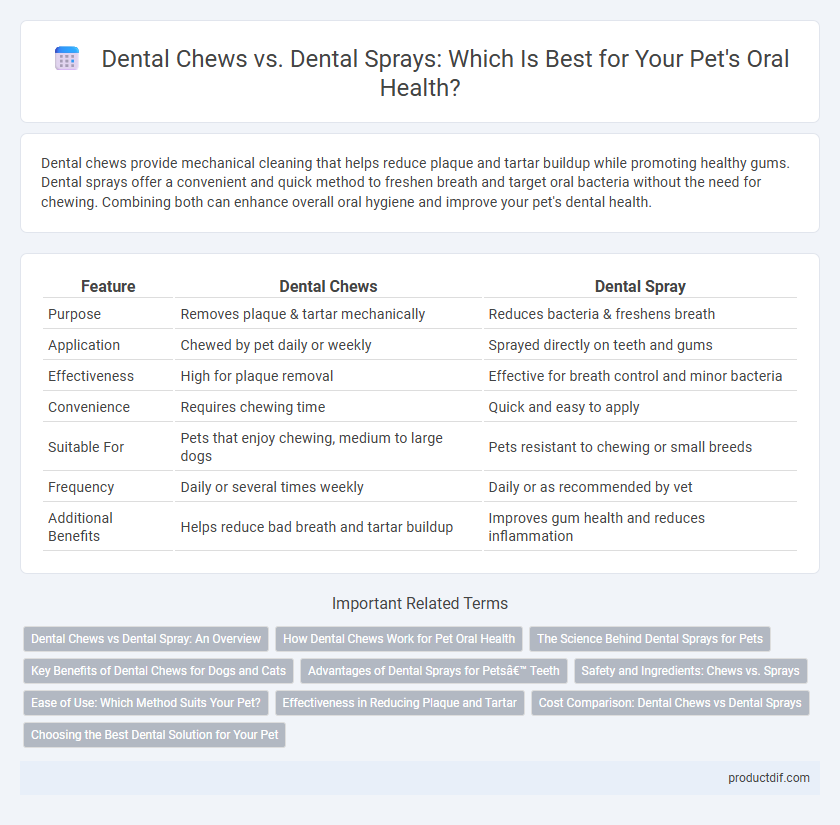Dental chews provide mechanical cleaning that helps reduce plaque and tartar buildup while promoting healthy gums. Dental sprays offer a convenient and quick method to freshen breath and target oral bacteria without the need for chewing. Combining both can enhance overall oral hygiene and improve your pet's dental health.
Table of Comparison
| Feature | Dental Chews | Dental Spray |
|---|---|---|
| Purpose | Removes plaque & tartar mechanically | Reduces bacteria & freshens breath |
| Application | Chewed by pet daily or weekly | Sprayed directly on teeth and gums |
| Effectiveness | High for plaque removal | Effective for breath control and minor bacteria |
| Convenience | Requires chewing time | Quick and easy to apply |
| Suitable For | Pets that enjoy chewing, medium to large dogs | Pets resistant to chewing or small breeds |
| Frequency | Daily or several times weekly | Daily or as recommended by vet |
| Additional Benefits | Helps reduce bad breath and tartar buildup | Improves gum health and reduces inflammation |
Dental Chews vs Dental Spray: An Overview
Dental chews offer mechanical cleaning by reducing plaque and tartar buildup on pets' teeth, promoting healthier gums through consistent chewing action. Dental sprays provide a convenient, topical solution that targets bacteria and freshens breath with active ingredients like chlorhexidine or enzymes. Both methods contribute to oral hygiene, but dental chews excel in physical abrasion while sprays enhance bacterial control and breath freshness.
How Dental Chews Work for Pet Oral Health
Dental chews promote pet oral health by mechanically removing plaque and tartar as pets chew, stimulating saliva production that naturally helps reduce bacteria. These chews often contain enzymatic agents and ingredients like chlorhexidine or antibacterial enzymes to enhance cleaning and freshen breath. Regular use of dental chews supports gum health and prevents periodontal disease by maintaining a cleaner mouth environment.
The Science Behind Dental Sprays for Pets
Dental sprays for pets utilize antimicrobial agents and enzymes that target plaque-causing bacteria, effectively reducing oral biofilm and preventing gum disease. Scientific studies demonstrate that these sprays improve oral hygiene by distributing active ingredients evenly across hard-to-reach areas in the pet's mouth. Unlike dental chews, sprays offer a non-invasive option with precise dosage control, promoting better breath and overall oral health.
Key Benefits of Dental Chews for Dogs and Cats
Dental chews for dogs and cats effectively reduce plaque and tartar buildup by promoting chewing action that mechanically cleans teeth. They support fresh breath and improve oral health by stimulating saliva production, which helps neutralize harmful bacteria. Regular use of dental chews also aids in reducing the risk of periodontal disease and enhances overall dental hygiene compared to dental sprays.
Advantages of Dental Sprays for Pets’ Teeth
Dental sprays for pets offer targeted antimicrobial action that helps reduce plaque and tartar buildup more effectively than many traditional dental chews. These sprays are easy to apply, reaching areas that chews might miss, such as the back teeth and gumline, ensuring comprehensive oral hygiene. Moreover, dental sprays promote fresher breath and prevent gingivitis without the calorie intake associated with chews, making them ideal for pets with dietary restrictions.
Safety and Ingredients: Chews vs. Sprays
Dental chews typically contain natural enzymes and fibrous ingredients that help reduce plaque buildup safely, while dental sprays often include antibacterial agents designed for quick application without the risk of choking. Chews may pose a minor hazard if pets are aggressive chewers, but their ingredients usually emphasize digestibility and oral health benefits. Sprays generally use gentle, non-toxic compounds, making them suitable for pets with chewing difficulties or those prone to swallowing concerns.
Ease of Use: Which Method Suits Your Pet?
Dental chews provide a convenient, mess-free option for pet owners seeking to improve oral health, with pets often enjoying the treat-like texture and taste that encourages consistent use. Dental sprays offer a quick, targeted application ideal for pets sensitive to chewing or those who refuse dental chews, allowing easy access to hard-to-reach areas like the back teeth and gums. Choosing between dental chews and sprays depends on your pet's chewing habits, temperament, and your ability to integrate the product into daily care routines.
Effectiveness in Reducing Plaque and Tartar
Dental chews provide a mechanical action that effectively reduces plaque and tartar buildup by chewing, which helps scrape away debris from teeth surfaces. Dental sprays contain antibacterial agents that target oral bacteria and reduce plaque formation, though they may be less effective in physically removing tartar compared to chews. Studies show that combining dental chews with sprays can enhance oral hygiene by addressing both bacterial growth and physical debris.
Cost Comparison: Dental Chews vs Dental Sprays
Dental chews typically cost between $15 and $30 for a month's supply, offering a convenient and tasty option for pet dental care. Dental sprays are often priced lower, ranging from $10 to $20 per bottle, but may require daily application for effectiveness. Evaluating cost-efficiency involves considering frequency of use, pet preference, and overall oral health benefits each product provides.
Choosing the Best Dental Solution for Your Pet
Dental chews provide mechanical cleaning by reducing plaque and tartar as pets chew, promoting oral health and fresh breath. Dental sprays deliver antimicrobial agents directly to the gums and teeth, offering targeted protection against bacteria and inflammation. Selecting the best dental solution depends on your pet's chewing habits, oral health needs, and ease of application to ensure effective and consistent dental care.
Dental chews vs dental spray Infographic

 productdif.com
productdif.com